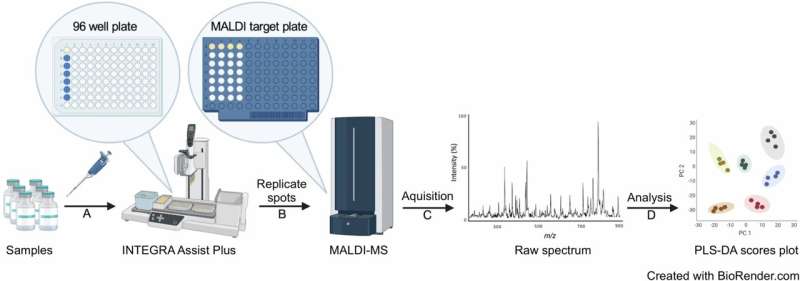This article has been reviewed according to Science X's editorial process and policies. Editors have highlighted the following attributes while ensuring the content's credibility:
fact-checked
peer-reviewed publication
trusted source
proofread
Proof-of-concept method uses machine learning to detect fake vaccines in supply chains

Research led by University of Oxford researchers describes a first-of-its-kind method capable of distinguishing authentic and falsified vaccines by applying machine learning to mass spectral data. The method proved effective in differentiating between a range of authentic and 'faked' vaccines previously found to have entered supply chains.
The results of the study, which appear in npj Vaccines, provide a proof-of-concept method that could be scaled to address the urgent need for more effective global vaccine supply chain screening. A key benefit is that it uses clinical mass spectrometers already distributed globally for medical diagnostics.
The paper is titled "Using matrix assisted laser desorption ionization mass spectrometry combined with machine learning for vaccine authenticity screening."
The global population is increasingly reliant on vaccines to maintain population health with billions of doses used annually in immunization programs worldwide. The vast majority of vaccines are of excellent quality. However, a rise in substandard and falsified vaccines threaten global public health.
Besides failing to treat the disease for which they were intended, these can have serious health consequences, including death, and reduce confidence in vaccines. Unfortunately, there is currently no global infrastructure in place to monitor supply chains using screening methods developed to identify ineffective vaccines.
In this new study, researchers developed and validated a method that is able to distinguish authentic and falsified vaccines using instruments developed for identifying bacteria in hospital microbiology laboratories.
The method is based on matrix-assisted laser desorption/ionization-mass spectrometry (MALDI-MS), a technique used to identify the components of a sample by giving the constituent molecules a charge and then separating them. The MALDI-MS analysis is then combined with open-source machine learning.
This provides a reliable multi-component model which can differentiate authentic and falsified vaccines, and is not reliant on a single marker or chemical constituent.
The method successfully distinguished between a range of genuine vaccines—including for influenza (flu), hepatitis B virus, and meningococcal disease—and solutions commonly used in falsified vaccines, such as sodium chloride.
Professor James McCullagh, study co-leader and Professor of Biological Chemistry in the Department of Chemistry, University of Oxford said, "We are thrilled to see the method's effectiveness and its potential for deployment into real-world vaccine authenticity screening.
"This is an important milestone for the Vaccine Identity Evaluation (VIE) consortium which focuses on the development and evaluation of innovative devices for detecting falsified and substandard vaccines, supported by multiple research partners including the World Health Organization (WHO), medicine regulatory authorities and vaccine manufacturers."
More information: Rebecca Clarke et al, Using matrix assisted laser desorption ionisation mass spectrometry combined with machine learning for vaccine authenticity screening, npj Vaccines (2024). DOI: 10.1038/s41541-024-00946-5




















